Clean Diesel Tribal Grants
On this page:
 2016 Tribal Request for Proposals now closed.
2016 Tribal Request for Proposals now closed.
EPA’s Office of Transportation and Air Quality solicited proposals nationwide for Tribal projects that achieve significant reductions in diesel emissions and diesel emissions exposure, particularly from fleets located in areas designated as having poor air quality. EPA anticipates $1 million will be awarded to eligible Tribal applicants.
The closing date and time for receipt of proposals was Tuesday, August 23, 2016, at 4:00 p.m. Eastern Time (ET) in order to be considered for funding. Proposal packages must be submitted electronically to EPA through Grants.gov (www.grants.gov).
| Date | |
|---|---|
Request for Proposals RFP CLOSED |
|
| Application Deadline | Tuesday, August 23, 2016 at 4:00 p.m. ET |
| Anticipated Notification of Selected Applicants | October 2016 |
| Anticipated Funding of Awards | January 2017 |
Supporting Information for RFP
- 2016 Tribal Project Narrative Sample (Word)(13 pp, 543 K, May 2016)
- 2016 Tribal Applicant Fleet Description Sample (Excel)(4 pp, 738 K, May 2016)
- Tribal Priority County and Area List (PDF)(12 pp, 320 K, April 2016, About PDF)
Frequently Asked Questions
Tribal Frequently Asked Questions (FAQ) (PDF) was updated weekly during the application period. All questions and answers, including those from all information sessions, have been added to this document.
RFP Information Sessions
EPA hosted two information sessions regarding this Request for Proposals.
Webinar Slides (44 pp, 350 K, June 2016, About PDF)
Eligible Applicants
U.S. tribal agencies or intertribal consortia with jurisdiction over transportation or air quality are eligible to apply for Clean Diesel Tribal Grants.
Tribal agencies are defined as federally recognized Indian tribal governments, which are any Indian tribe, band, nation, or other organized group or community (including Native villages) certified by the Secretary of the Interior as eligible for the special programs and services provided through the Bureau of Indian Affairs as well as any organization or intertribal consortium that represents federally recognized tribes.
For the purposes of Clean Diesel Tribal Grants, “intertribal consortium” is defined as a partnership between two or more tribes that is authorized by the governing bodies of those tribes to apply for and receive assistance under this program. Intertribal consortia are eligible to receive assistance under this program only if the consortium demonstrates that all members of the consortium meet the eligibility requirements for the program and authorize the consortium to apply for and receive assistance by submitting to EPA documentation of (1) the existence of the partnership between Indian tribal governments, and (2) authorization of the consortium by all its members to apply for and receive the assistance.
Please refer to the full RFP for specific information about this competition.
Eligible Use of Funding
Eligible diesel vehicles, engines and equipment may include school buses, Class 5 – Class 8 heavy-duty highway vehicles, marine engines, locomotives and nonroad engines, equipment or vehicles used in construction, handling of cargo (including at ports or airports), agriculture, mining or energy production (including stationary generators and pumps).
Grant funds may be used for clean diesel projects that use:
- EPA verified retrofit technologies or certified engine configurations
- California Air Resources Board (CARB) Exit verified retrofit technologies or certified engine configurations
- Idling reduction technologies that are EPA verified
- Aerodynamic technologies and low rolling resistance tires that are EPA verified
- Early engine, vehicle, or equipment replacements with certified engine configurations
Funds awarded under this program cannot be used to fund emissions reductions mandated under federal law. Equipment used for testing emissions or fueling infrastructure is not eligible for funding.
Please refer to the full RFP for specific information about this competition.
Grant Process
The RFP includes information on how to prepare and submit a proposal package. The proposal package must be received by the deadline and include the following information:
- Project Narrative (no more than 11 pages)
- Standard Form SF 424 – Application for Federal Assistance
- Standard Form SF 424A – Budget Information
- Applicant Fleet Description information (not included in page limit)
- Cost-Share Commitment Letters, if applicable (not included in page limit)
- Letters of Support/Partnership, if applicable (not included in page limit)
- Mandated Measures Justification Supporting Information, if applicable (not included in page limit)
After the closing date, all eligible applications will be reviewed and ranked. Selected projects may be fully or partially funded.
Please refer to Appendix A of the RFP for specific instructions on downloading an application package from grants.gov.
Tools and Resources for Applicants
- Tips for a Successful Diesel Retrofit Project (PDF) (7 pp, 500 K, April 2013, EPA-420-B-13-025, About PDF) provides tips to help you get started and avoid common mistakes.
- Technology Tips: Diesel Emissions Reduction Program (DERA): Technologies, Fleets and Projects Information (PDF) (36 pp, 1.3MB, October 2011, EPA-420-P-11-001, About PDF) provides information about retrofit technologies and what to look for.
- Clean Diesel Clearinghouse (CDCH) Exit is a web-based tool that helps users determine the best available emission reduction technology for retrofitting diesel-powered vehicles and equipment.
Reporting Templates for Grantees
- Quarterly Reporting Template (Excel)(6 pp, 206 K, March 2014)
- Final Reporting Template, Part 1 (Word)(7 pp, 113 K, March 2014)
- Final Reporting Template, Part 2 (Excel)(6 pp, 192 K, March 2014)
The Diesel Emissions Reduction Act (DERA) grants awarded to tribal nations.
Tribal Grants: Past Request for Proposals (RFP) and Documents
- 2015 Tribal Grants
EPA awarded over $1.5 million in grant funds to six tribes in Alaska, California, New Mexico, and Washington for engine repowers, vehicle replacements, and truck stop electrification that reduces truck idling.
FY 2015 Awardee: Gila River Indian Community
Location: California (Region 9)
Award Amount: $389,000
Description: The Gila River Indian Community received $389,000 to replace four nonroad vehicles owned by Gila River Farms with newer Tier 4 engine vehicles used for agriculture. The estimated emissions reductions are significant, especially for ozone precursors. Reducing diesel emissions from Gila River Farms operations will help to protect families, children in schools, vulnerable individuals visiting medical facilities, and community members as well as having positive impacts on health of farm workers.FY 2015 Awardee: Makah Tribal Council
Location: Washington (Region 10)
Award Amount: $663,302
Description: The Makah Tribal Council received $663,302 to repower six commercial fishing vessels with new propulsion engines. One vessel was also repowered with three new auxiliary engines. Reducing diesel emissions will have a positive human health benefit, not only for the crews aboard the repowered vessels, but also within the marina and harbor areas of Neah Bay. Positive health effects resulting from a reduction in air pollution are expected within the community and surrounding areas as well.FY 2015 Awardee: Native Village of Karluk
Location: Alaska (Region 10)
Award Amount: $166,754
Description: The Native Village of Karluk received $166,754 to replace two stationary, unregulated, John Deere diesel engines with Marathon generators for power production in the power plant. The new Tier 3 generators will improve efficiency and lower emissions emanating from the center of the village near the Karluk School, playground, and surrounding residences and offices.FY 2015 Awardee: Pueblo of Acoma
Location: New Mexico (Region 6)
Award Amount: $82,000
Description: The Pueblo of Acoma received $82,000 to install 30 truck stop electrification units at the Sky City Travel Center, where no such equipment currently exists, and to promote the equipment for maximum utilization and idling reduction in long-haul trucks. This project will protect human health and the environment by meeting and maintaining health-based air quality standards and reducing exposure to toxic air pollutants.FY 2015 Awardee: Rampart Village Council
Location: Alaska (Region 10)
Award Amount: $138,883
Description: The Rampart Village Council received $138,883 to remove two unregulated stationary diesel generators used for energy production in a tribally-owned power plant and replace them with certified Tier 3 generators. The new generators will significantly reduce emissions and improve efficiency.FY 2015 Awardee: Swinomish Indian Tribal Community
Location: Washington (Region 10)
Award Amount: $71,419
Description: The Swinomish Indian Tribal Community received $71,419 to reduce diesel pollution from the Swinomish Fishing Fleet. The project replaced one unregulated marine engine with lower emission Tier 3 marine diesel engine. This is the third phase of a project that is expected to improve the air quality for the Swinomish Indian Tribal Community, adding to the emissions reductions resulting from Phases 1 and 2. - 2014 Tribal Grants
EPA awarded over $925,000 in grant funds for tribes in Washington to remove older marine diesel engines that emit harmful air pollutants and replace them with newer engines for more efficient marine vessels.
FY 2014 Awardee: Lummi Nation
Location: Washington (Region 10)
Award Amount: $77,250
Description: The Lummi Nation received $77,250 to reduce diesel pollution from two marine fishing fleet vessels that are used to harvest salmon, halibut, crab, and shrimp. The average year of diesel engines in the Lummi fishing fleet is 1992. These older engines have poor performance, low fuel-efficiency, and high emissions.The Lummi Reservation is located in Whatcom County and is ranked among the 80th percentile of the worst counties in the United States for the number of people living in areas where cancer risk from HAPs (Hazardous Air Pollutants) exceeds 1 in 10,000, for which diesel emissions is a high contributing factor. Repowering marine vessels is one of the most efficient and cost-effective techniques for cleaner air and a healthier environment.
FY 2014 Awardee: Swinomish Indian Tribal Community
Location: Washington (Region 10)
Award Amount: $792,000
Description: The Swinomish Indian Tribal Community received $792,000 to reduce diesel pollution from the Swinomish Fishing Fleet. The project replaced twelve older and more polluting marine diesel engines with new, low-emission diesel engines. The project is expected to improve the air quality for the Swinomish Indian Tribal Community.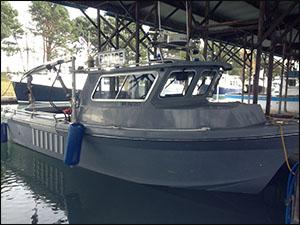 Marine engine replacement
Marine engine replacementFY 2014 Awardee: Upper Skagit Tribe
Location: Washington (Region 10)
Award Amount: $55,890
Description: The Upper Skagit Tribe received $55,890 to fund a marine engine repower project. The project repowered the Upper Skagit Indian Tribe’s Fisheries Regulatory Compliance vessel by replacing an older, more polluting engine, with a newer, more efficient marine diesel engine. Waterways immediately adjacent to the Skagit/Samish watersheds experience a disproportionate amount of air pollution from diesel fleets. This project will reduce emissions from the compliance vessel, which will be used in the ports around Skagit, Island and Whatcom counties. - 2013 Tribal Grants
EPA received two tribal applications for the FY 2013 competition, requesting over $748K. EPA awarded grants to repower fishing vessels to two tribal applicants.
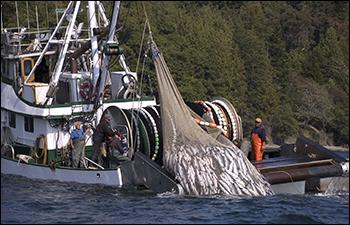 Repower 12 marine fishing vessels
Repower 12 marine fishing vessels
Photo Courtesy of Northwest Indian Fisheries CommissionFY 2013 Awardee: Lummi Nation
Location: Washington (Region 10)Award Amount: $272,036
Description: EPA awarded the Lummi Nation a DERA FY 2013 grant of $272,036 to repower 12 marine vessels with Tier 2 engines. Currently the marine vessels operate with Tier 0 engines.
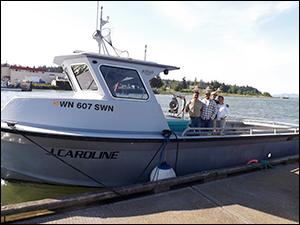 Upgrade marine engines and install shore power pedestals
Upgrade marine engines and install shore power pedestalsFY 2013 Awardee: Swinomish Indian Community
Location: Washington (Region 10)
Award Amount: $467,846
Description: In 2013, EPA awarded the Swinomish Indian Tribal Community $467,846 to pay for up to 40% of the cost to replace the Tier 0 engines of 12 marine vessels with Tier 2 engines, and install 18 shore power pedestals in the tribe’s marina. - 2012 Tribal Grants
EPA received two Tribal applications for the FY 2012 competition, requesting over $600K. EPA awarded one grant to repower fishing vessel engines.
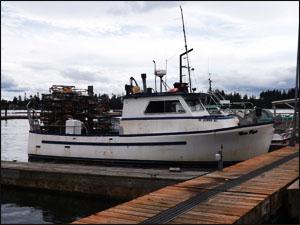 Fishing vessel with new Tier 2 engine
Fishing vessel with new Tier 2 engineFY 2012 and FY 2011 Awardee: Tulalip Tribe
Location: Washington (Region 10)
Award Amount: $346,620 in 2012 and $576,525 in 2011
Description: In 2012, EPA awarded the Tulalip Tribe $346,620 to pay up to 50% of cost to repower an additional 11 Tribal fishing vessels, upgrading them from Tier 0 to Tier 2.In 2011, EPA awarded the Tulalip Tribe $576,525 to replace 11 Tribal fishing vessel engines, upgrading them from Tier 0 to Tier 2. The Tulalip Tribal lands are located north of the Snohomish River in Washington State.
- 2011 Tribal Grants
EPA received seven Tribal applications for the FY 2011 competition, requesting a total of $2.5 million. EPA awarded four grants to repower fishing vessels and a generator and to retrofit mining equipment.
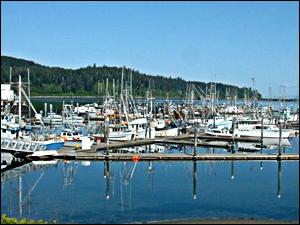 Nine upgraded fishing vessels
Nine upgraded fishing vesselsFY 2011 Awardee: Makah Tribe
Location: Washington (Region 10)
Award Amount: $750,000
Description: EPA awarded the Makah Tribe $750,000 to repower 11 fishing vessels. The Makah Tribe is located in the northern tip of the Olympic Peninsula of Washington state.
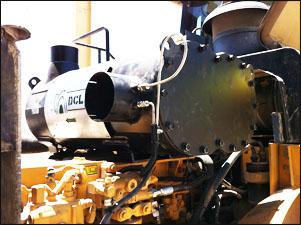 Cleaner mining equipment
Cleaner mining equipmentFY 2011 Awardee: Salt River Pima Maricopa Indian Community
Location: Arizona (Region 9)
Award Amount: $150,000
Description: EPA awarded the Salt River Pima Maricopa Indian Community $150,000 to retrofit seven pieces of equipment used for mining work on Tribal lands. The Tribe is located in the northeast part of the Phoenix, Arizona metropolitan area.
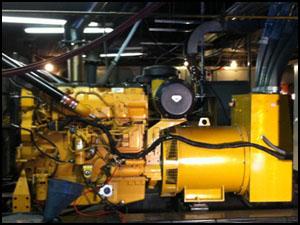 Upgraded generator engineFY 2011 Awardee: Tanana Chiefs
Upgraded generator engineFY 2011 Awardee: Tanana Chiefs
Location: Alaska (Region 10)
Award Amount: $59,000
Description: EPA awarded the Tanana Chiefs $59,000 to repower a generator which provides a significant amount of the village’s power. Located in Fort Yukon, Alaska, the village must rely on generators to supply electricity and heat.
- 2009-10 Tribal Grants
-
During the first Tribal Competition, EPA received a total of eight applications from Tribes located in Regions 5, 7, 9, and 10 requesting over $3.1 million in awards funds. EPA awarded four Tribal grants to retrofit, repower, and replace school buses, refuse haulers, buses and other diesel powered equipment.
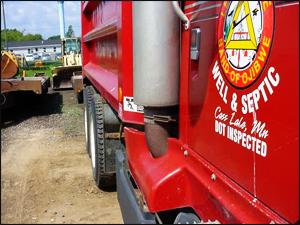 Dump truck with diesel oxidation catalyst
Dump truck with diesel oxidation catalystFY 2009/2010 Awardee: Leech Lake Band of Ojibwa
Location: Minnesota (Region 5)
Award Amount: $64,633
Description: EPA awarded Leech Lake Band of Ojibwe $64,633 to retrofit a street sweeper with a Diesel Oxidation Catalyst (DOC) and repower of two dump trucks. Leech Lake is located in north central Minnesota.
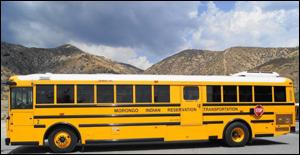
FY 2009/2010 Awardee: Morongo Band of Mission Indians
Location: California (Region 9)
Award Amount: $250,000
Description: EPA awarded Morongo Band of Mission Indians $250,000 to install diesel particulate filters on four school buses, a charter bus, a dump truck, and a water truck; and to replace two diesel schools buses with CNG powered school buses. The Tribal lands of the Morongo Band of Mission Indians are located along the San Gabriel and San Jacinto Mountains in Southern California along Interstate 10.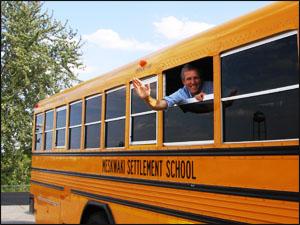 New, cleaner school bus
New, cleaner school busFY 2009/2010 Awardee: Sac and Fox Tribe of the Mississippi in Iowa
Location: Iowa (Region 7)
Award Amount: $190,000
Description: EPA awarded the Sac and Fox Tribe $190,000 to replace four school buses. The Tribe provided an additional $190,000 in matching funds. The Sac and Fox Tribe of the Mississippi lands are located in central Iowa, approximately 45 miles west of Cedar Rapids, Iowa.
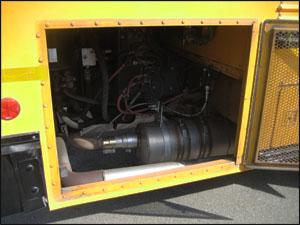 School bus with new diesel particulate filter
School bus with new diesel particulate filterFY 2009/2010 Awardee: Soboba Band of Luiseno Indians
Location: California (Region 9)
Award Amount: $78,000
Description: EPA awarded the Soboba Band of Luiseno Indians $78,000 to retrofit six of their school buses with diesel particulate filters. The buses travel through three heavily populated counties: Riverside, San Bernardino and San Diego. The first two are recognized as having some of the worst air quality in the nation.
